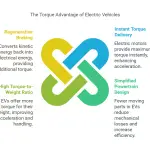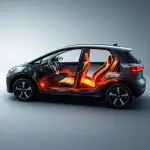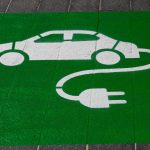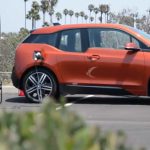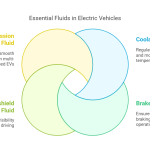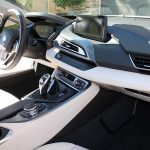Last Updated on January 29, 2025 by
Pure electric vehicles don’t charge themselves as that would defy the Laws of Thermodynamics and be equal to a perpetual motion machine. Electric cars do re-charge the batteries themselves in certain modes.
This means that when the accelerator is released the motor acts as a generator turned by the car’s inertia moving forward. The kinetic energy (mechanical energy) is converted into electrical energy through the motor-generator and re-charges the battery a little.
However, generation mode always sends less energy to the battery than received from it to drive the car – you can’t get something for nothing, or more out than you put in! The idea of perpetual motion has been explored for decades but it is still a hypothetical machine that doesn’t exist (yet)!
Electric cars are increasingly becoming dominant in the market. EV sales are set to increase up to 3 times by 2025. Range anxiety is the number one reason why more drivers don’t consider an EV, which is one reason why public charging stations are popping up all over the place.
No matter how popular electric cars are at the moment, there’s still a lot of confusion surrounding them. One such confusion is why electric vehicles don’t charge themselves.
Video -Why a self-charging electric car wouldn’t work
Can you wirelessly charge an electric car?
The vast majority of electric vehicles are charged by plugging a cable into a suitable charging port, either at home using a wall outlet, or at a charging station. Another prospect is being actively researched: charging by wireless with no physical contact between charger and car.
Wireless charging infrastructure isn’t in place yet, but it will make a huge difference to the industry. Passive charging relies on electromagnetic induction to connect between an EV and a charger and will eliminate the necessity of searching for suitable charge points.
The phenomenon of coupling alternating currents with magnetic fields is well-known – the only question is how to efficiently transfer the high power needed to charge an EV battery fast.
What is an EV charging robot?
Some advanced parking lots are beginning to install autonomous robot EV chargers, which can service all the cars parked by moving between them rather than being fixed in place.
Volkswagen’s Concept explores the possibility of using advanced AI and robots to go and charge an electric car wherever it is automatically, but the proposed system is in a very early stage according the latest Facebook Post.
Are self-charging cars possible?
It turns out the electric vehicles cannot charge themselves simply because the power generated from the motion of the wheels is not significant enough. Think of it as a bucket with a hole and every time you pour a mug of water, two mugs worth of water flows out through the hole. (Second Law of thermodynamics)
That said, Sono motors have presented a model that self-charges to some extent and boasts a range of up to 306 kms. Today we will address the questions of EV charging and its limitations.
Do Self-charging Cars Exist?
Yes, self-charging cars do exist. They are often called self-charging hybrid cars. These cars are not completely powered by electricity. In fact, electricity powers very little of its movement. It can provide assistance when overtaking, for example.
Is there a hybrid car that charges itself?
Hybrid vehicles pack a small electric battery along with the traditional combustion fuel tanks. In theory, it sounds like a good idea. In reality, it’s not as eco-friendly as you think.
Even traditional cars have batteries for lights and internal functions. These batteries are simply charged by the motion of the car that’s powered by burning fossil fuels.
That translates to burning a lot of fossil fuel to get some additional fuel efficiency while driving. In some cases, it’s treated more as a backup than a means for fuel-efficiency.
To conclude, self-charging cars do exist, but they do not truly recharge themselves. And when they do, the result is not significant enough to have any impact.
An Electric Car That Charges as You Drive
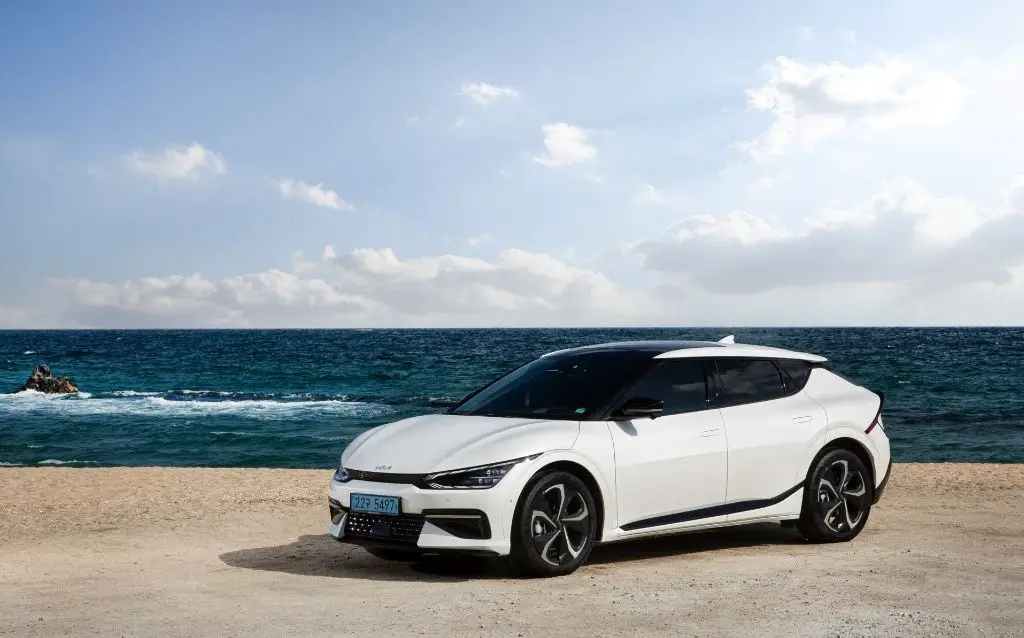
There are indeed electric cars that charge themselves while you drive. These cars are called self-driving hybrid cars. One prominent example of self-charging hybrid cars is Kia e-Niro. It’s available with and without the self-charging feature. Similarly, Toyota has several successful self-charging hybrid cars on the market.
Table – Popular Hybrid Cars that charge themselves and their battery sizes
Hybid Car | Engine Size | Fuel | Battery Size (kWh) |
Hyundai Tucson Estate Self-Charging Hybrid | 1.6 liter | Petrol | 1.5 |
Toyota C-HR Hatchback Self-Charging Hybrid | 1.8L | Petrol | 0.75 |
Kia Niro Estate Self-Charging Hybrid | 1.6L | Petrol | 1.56 |
Ford Kuga Estate Self-Charging Hybrid | 2.5 | Petrol | 2.1 |
Honda HR-V Hatchback Self-Charging Hybrid | 1.5L | Petrol | 0.918 |
Toyota RAV4 Estate Self-Charging Hybrid | 2.5 | Petrol | 1.6 |
Kia Sorento Station Wagon Self-Charging Hybrid | 1.6 | Petrol | 1.49 |
Why can’t electric cars charge themselves while driving
The problem with self-charging electric cars is that the phrase self-charging is misleading in this context. These batteries are not generating electricity for themselves. On the other hand, the batteries of self-charging hybrid cars are too small to have any significant impact.
When we contrast self-charging hybrid cars to normal hybrid cars (that combine electric and fuel power), the latter comes out on top 9 out of 10 times. They are more practical and usable across road conditions.
Why Don’t Electric Cars Have Alternators?
There are several reasons electric cars do not have alternators:
- Electricity is not created by alternators out of thin air – they need a secondary energy source (mechanical energy) to operate
- In gas-powered vehicles, it is generated mechanically through the operation of the engine and the combustion of fuel.
- Since EVs do not have engines, an alternator would be without a source of mechanical rotational power to drive the rotating magnet.
- The rechargeable battery of an electric vehicle might be used to turn the alternator. However, doing so would be counterproductive because it would consume more electricity than it produced.
Do hybrid cars have alternators?
As you can see, the question has a clear answer. Electric cars are not capable of charging themselves, and that’s the reason they don’t have alternators.
In electric vehicles (EVs), a DC-to-DC converter is used to supply energy to a significantly smaller (12-volt) cell. The car can subsequently use the battery to start the vehicle and supply electricity to the vehicle’s electrical systems once the primary battery has been disconnected.
Do hybrids have starters and alternators?
This DC-to-DC converter basically functions as an alternator, and you have to replenish the battery because fuel burning doesn’t produce electricity.
It’s conceivable that in the coming decades, electric vehicles will be able to recharge themselves using solar energy, dynamic charging roads, or some other brilliant concept that we haven’t even thought of. They will be able to travel great distances without pausing.
However, we’re not quite there yet.
Can You Charge an Electric Car With a Generator While Driving?
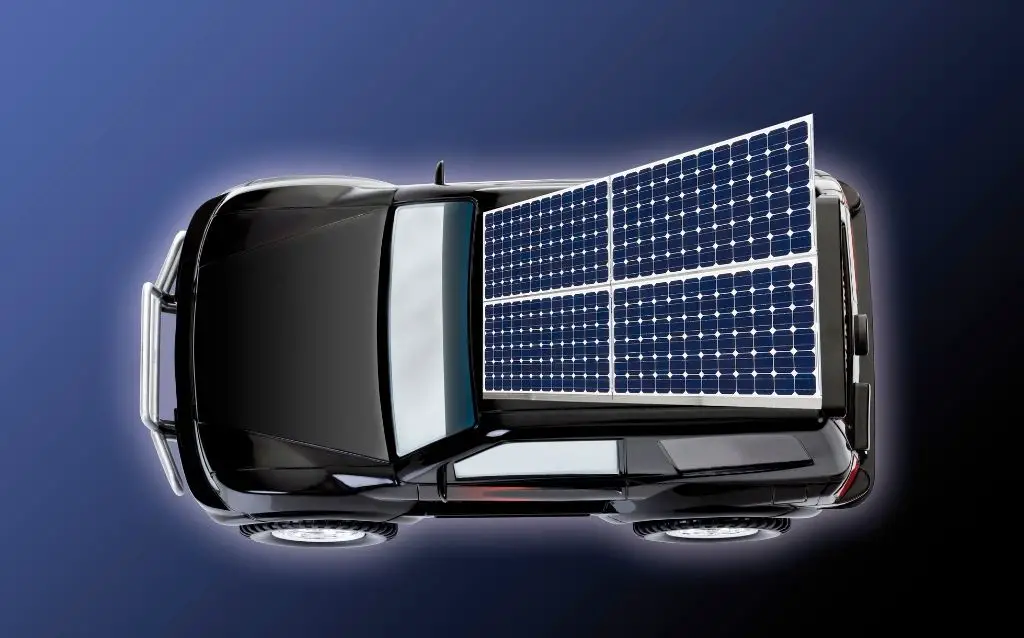
It is possible to charge an electric car with a generator while driving, both in theory and in practice. The basic premise is sound, but in practice leaves much to be desired.
A basic EV may only need 15 watts of its battery to travel at a steady speed of, say, 60 miles per hour. In light of this, the range of an EV may be doubled if a 7.5kw generator could be transported and operated to recharge the batteries while the EV is being driven.
However, there are several challenges to charging an EV using a generator.
Can a portable generator charge an electric vehicle?
The first challenge is also the most obvious? How are you going to carry a generator in your car? Generators are big, heavy, and noisy — not the type of machines you want in an automobile.
The second drawback is not about the ease or difficulty of carrying and charging your car with a generator. It’s about the point of it.
If you want to switch to EVs for environmental reasons, running generators with fossil fuels defeat the entire purpose of your undertaking. And if you switched due to petroleum costs, you are not doing yourself a favor by buying petroleum to run the generator.
It’s unfortunate that generators are not a viable answer to self-charging EV batteries. You can use the method for a particularly long trip every once in a while, as an emergency power supply, but it makes no sense in the long run.
Key points video
Can You Charge an Electric Car With a Solar Panel While Driving?
Power plants use solar to reduce air pollution, why can’t EVs do the same thing? In theory, you can charge an electric car with solar panels while driving. In practice, you can’t.
The reasons behind this are very simple. It’d simply take too much time for overhead solar panels to generate any substantial amount of energy.
The whole point of solar panels charging the batteries as the car moves is to be able to drive continuously. But if the solar panels are your only source of power, you will use significantly more energy than what the panels would make.
How many solar panels would it take to charge an electric car?
Theoretically, it’s possible to use solar panels to charge EV batteries on the go. The problem is that solar panels are not that efficient at the moment. For example, to charge a Peugeot e208 you would need about 7 amps of AC power for 24 hours using about 3000 watts of solar panels, that’s 10 big 300 watt solar panels.
With improvements in solar panel and battery technologies, we can expect this to be a reality in the future. NASA’s rovers on Mars run on solar energy, which shows that this phenomenon is possible.
Calculator – how long to charge an EV with solar panels?
Why can’t electric cars charge themselves while driving with solar or wind?
The same principle applies to wind power. It’s hypothetically possible to charge a car with wind energy as it moves. In practice, our energy harnessing technologies are not efficient enough to do it.
Using solar panels to charge cars on the move is the future of self-charging electric cars, but we are still quite some distance away from it.
FAQ Relating to Electric Vehicle Self-charging
In the following segment, we answer some of the most common questions people have about electric vehicles and charging these vehicles. A self-charging EV is the Holy Grail of the automotive Industry in 2023 and we should see great strides in this technology in the next few years as drivers insist on cars with a greater driving range.
Do Electric Cars Charge Themselves?
Yes and no. Electric cars do charge themselves, but it’s through fossil fuel burning.
Self-charging hybrid cars are becoming popular as self-charging cars, but that phrase is indeed misleading. These are simply hybrid cars where fossil fuel powers a small battery to power accessories. The size of this auxiliary battery is an issue as well. It’s not powerful enough to have any significant impact on the performance of the car.
Why Don’t They Put Alternators on Electric Cars?
Manufacturers do not put alternators in electric cars because EVs are not designed for alternators. Closed-circuit machines always consume more energy than they can generate by themselves.
Can we use an alternator on a electric car?
Since EVs are also closed-circuit machines, it makes no sense to add alternators to them. As fuel burning doesn’t produce electricity, DC-to-DC converters basically act as alternators in electric vehicles.
At the moment, the question of alternators in electric cars is not out of the window. It would, however, take a lot of technological advancement to effectively use alternators in electric vehicles.
Do Electric Cars Recharge While Driving?
Electric cars can recharge themselves while driving, but only when slowing down using regenerative braking. Self-charging hybrid cars, on the other hand, always charge themselves while driving. However, these cars are not electric cars by definition since they have both combustion and electric technologies.
How do electric cars charge on the road?
The problem with self-charging hybrid cars is that they are not viable in the long. The advantages the additional electric power gives are not significant enough for people to spend that extra money.
From an ethical and environmental perspective also, self-driving hybrid cars make very little sense. You end up burning more fossil fuels to recharge a very small battery in your hybrid car.
Can Tesla Charge Itself?
Tesla can charge itself through a process called regenerative braking. The term regenerative braking refers to slowing a car faster than it can be slowed by friction and drag.
As yet, Teslas don’t have on-board solar panels, which is one way that an EV could charge while it’s being driven and extend the range of your daily drive. Other suggestions, such as having motors on a front axle and generators on the others, wouldn’t work as generators experience a drag on the mechanical force driving it. Hence, the car would simultaneously slowed down and the car would eventually grind to a halt.
Can Tesla charge itself while driving?
It is possible to turn a motor that draws electricity into an electricity generator to perform work. By slowing down the car, the motor works in generator mode and a voltage control circuit adjusts the output voltage to recharge the battery. recharges the batteries. In order to slow a car, you must be moving, or you must be going downhill. It does not work on flat terrain while cruising.
While Tesla does conserve some energy through this process, it is not a replacement for externally charging your EV.
Why can’t self-charging electric cars be a reality?
Ignoring the many technical challenges, some auto companies are making headway in the self-charging field. However, an electric vehicle that can completely charge itself while driving would contravene basic laws of physics and constitute a perpetual motion machine – these hypothetical machines don’t exist.
If there was a public charging station on every block, would electric cars be more popular?
Yes, very probably, given that one of the major reasons for not buying an EV is range anxiety i.e. running out of battery. The other reason, of course, is the higher cost of EVs compared to ICE vehicles.
How does the electric car’s battery work and how long does it take to charge?
An electric car battery is big and most small cars have 50 to 70 kWh battery sizes installed. These huge batteries store electrical used to drive the wheels and also operate accessories such as AC, sound systems and wipers. As you can imagine, everything on a pure EV is electric.
Different size battery takes different lengths of time to recharge, depending on the charging method. A home charger plugged into the mains will take about 30 hours for a 50kWh battery, delivering 1.6kW per hour. A Type 2 charge takes about 12 hours and powerful 100kW charge can load up the battery to 80% capacity in an hour or two.
What is the difference between an electric current and a charging time?
When you plug in an electric car charger with a slow-charging capacity it will draw about 7 amps from a European outlet (240 volts) and around 14 amps in the US (120 volts).
Electronic circuits adjust the DC voltage to the battery and monitor to ensure the most efficient current transfer. Basically, more powerful chargers measured in kWh ratings deliver more current so the charging time goes down.
Can an electrical generator be used to charge an electric car’s battery?
Yes, an ordinary electric generator can be used to charge an EV using the so-called ‘granny cable’ or slow-charger
Is there a secondary energy source that can be used to power electric cars?
Hydrogen fuel cells are being researched as a secondary energy source for EVs and have been used in prototypes.
Would gas or diesel fuel be more efficient for powering electric vehicles?
Electric motors are much more efficient than petrol or diesel engines. An electric motor can convert up to 90% of the electrical energy supplied into mechanical energy to drive a car’s wheels. For an ICE vehicle, the efficiency is less than 20%.
How do diesel engines compare to electric motors?
- Lavender Oil - February 2, 2025
- Electric Cars with Solar Panels On Roof: The Future of Sustainable Driving - January 29, 2025
- Best Cheapest Electric Car Reddit Comments - January 23, 2025


